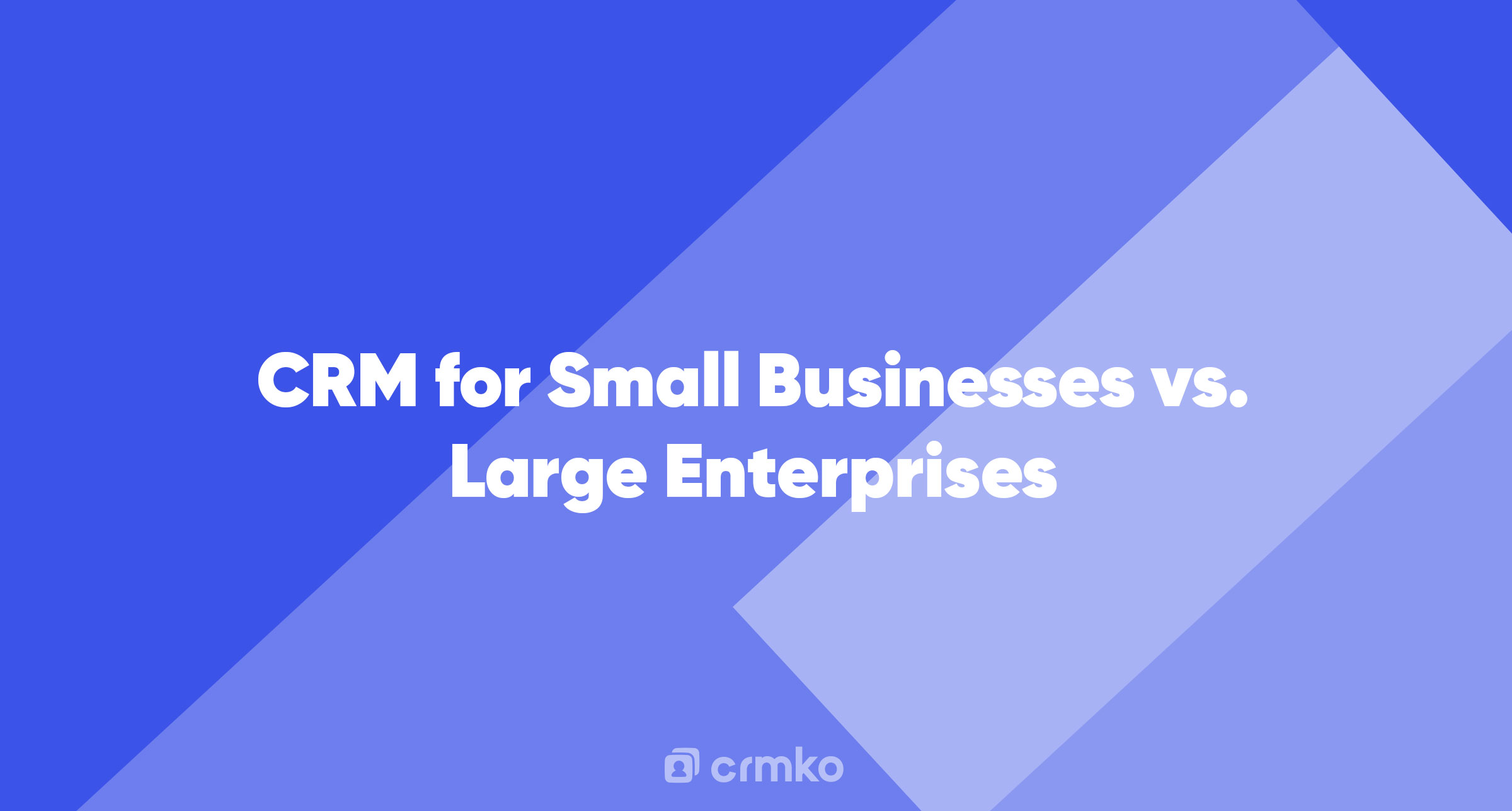Customer Relationship Management (CRM) software has become essential for businesses of all sizes. Whether you are a small startup or a large enterprise, implementing a CRM system can streamline processes, save time, and increase profits. However, choosing the right CRM solution for your business can be a daunting task. In this article, we will explore the differences between CRM for small businesses and large enterprises, and provide valuable insights to help you make an informed decision.
What is CRM for Small Business?
CRM for small businesses, also known as niche CRM, is customer relationship management software specifically designed to cater to the needs of small and mid-sized businesses. These solutions help small businesses handle customer relationships, track sales, and streamline marketing processes. Unlike enterprise CRMs, small business CRMs focus on providing limited functionality that is essential for the sales department. They prioritize usability and aim to make the software easy to deploy, intuitive, and straightforward.
What is an Enterprise CRM?
In contrast, enterprise CRMs are designed for large corporations that operate complex business workflows and have robust business needs. These CRMs target organizations with multiple customer-facing departments, sales teams, and enormous databases. Enterprise CRMs offer a wide range of features to accommodate the intricate operations of large corporations. They provide centralized and instant access to CRM data, advanced contact management, sales analytics, sales automation, marketing automation, and sales forecasting.
Key Differences between Small Business CRM and Enterprise CRM
While both small business CRM and enterprise CRM share the common goal of managing data more efficiently, creating personalized sales outreach, and improving customer service support, there are several key differences between the two.
Features
Small business CRMs focus on providing a standard set of features beneficial to smaller companies. These features include contact management, sales pipeline management, task management, and reporting. However, as the small business CRM market expands, vendors offer more complex functionalities such as sales automation, social media marketing, and email marketing. On the other hand, enterprise CRMs offer a wide range of features that accommodate the most complex business processes of large corporations, including customer opportunity management, advanced contact management, sales analytics, sales automation, marketing automation, and sales forecasting.
Deployment Options
Small business CRMs are traditionally cloud-based or web-based, which means the software is hosted on the vendor's servers and can be accessed from anywhere with an internet connection. This is ideal for small businesses as it eliminates the need for expensive hardware setup and maintenance. On the other hand, enterprise CRMs can be deployed as on-premise solutions, which means the software is hosted on the company's own servers. Although on-premise CRMs provide more control and security over data, they require significant upfront and maintenance costs, including hardware, physical space, and IT resources.
Pricing Mode
Enterprise CRMs are generally more expensive than small business CRMs. They often require long-term contracts and have higher upfront costs. Small business CRMs, on the other hand, offer different plans and pricing options to cater to companies with different needs. They are usually sold through monthly or annual subscriptions, making them more affordable for small businesses. However, over time, the monthly subscription fees can accumulate to a significant amount, especially for businesses with large sales teams.
User Interface and User Experience
Small business CRMs prioritize user-friendly interfaces and intuitive user experiences. They are designed to be easily navigated and require minimal training. In contrast, enterprise CRMs often have more complex user interfaces and require extensive training sessions for employees to learn how to use the system effectively. Enterprise vendors may provide dedicated training and support to ensure the adoption of the CRM system among the staff.
Integration and Learning Curve
Small business CRMs are typically ready-to-use and require minimal setup and integration with existing business workflows. They offer a greater level of customer support and have dedicated customer success teams to assist with implementation. Enterprise CRMs, on the other hand, may require more time and effort to integrate with complex business workflows. They often involve extensive training sessions and may have a steeper learning curve for employees.
Choosing the Right CRM for Your Business
When choosing a CRM for your business, it is important to consider your specific needs, stage of business growth, and budget. Small business CRMs are ideal for startups and growing companies with limited resources and simpler business processes. They offer affordable pricing, user-friendly interfaces, and essential features for sales and marketing. On the other hand, enterprise CRMs are suitable for large corporations with complex business workflows, extensive data management needs, and the budget to invest in advanced features and customization.
Conclusion
CRM software is a powerful tool that can greatly benefit businesses of all sizes. Whether you choose a CRM for small businesses or an enterprise CRM, the key is to find a solution that aligns with your specific needs. Small business CRMs offer affordability, user-friendliness, and essential features, while enterprise CRMs provide advanced functionalities and customization options. By understanding the differences between the two and considering your business stage and goals, you can make an informed decision that will drive growth and success.
Remember, the right CRM is not just about size, but about finding the perfect fit for your business. So take the time to research and explore different options before making a choice. With the right CRM system in place, you can streamline processes, improve customer relationships, and ultimately drive revenue for your business.
*This article was written based on research and analysis of various sources on CRM for small businesses and large enterprises. The information provided is for informational purposes only and should not be considered professional advice.
